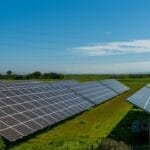Key Takeaways
- Investing in solar can significantly reduce your energy costs, leading to immediate and ongoing savings.
- Solar investments can increase the value of your property and take advantage of various government incentives.
- Understanding the landscape of the solar market is key to making informed investment decisions.
- Solar energy developments contribute to job creation and local economic growth.
- Future advancements in solar technology and efficiency are expected to enhance investment returns.
Shining a Light on Smart Sustainability: Investing in Solar
When we talk about smart investments, we’re not just looking at the bottom line; we’re also considering the impact on our planet. Solar energy is at the forefront of sustainable investing, offering not only financial returns but also contributing to a healthier environment. It’s a way to take control of our energy needs while promoting a green future.
The Financial Feasibility of Solar Energy
Let’s cut to the chase and talk about the bottom line, because that’s what really counts when it comes to investing. The price tag on solar panels has dropped by over 70% in the last ten years. This means that solar energy is not just within reach, but often less expensive than traditional energy sources. And here’s the best part: once you’ve paid for the initial installation, the sun doesn’t charge you for its services. The energy it provides is completely free.
- The initial outlay for solar panels is typically between $15,000 and $25,000, depending on the size of the system.
- Many states provide tax credits and rebates that can reduce the initial investment by 30% or more.
- The average solar panel system can save a homeowner up to $1,000 per year on electricity bills.
If you’re considering where to invest your money, solar energy isn’t just a ‘good’ choice; it’s a smart one. It’s like buying a house that reduces your monthly expenses and appreciates in value over time. That’s the kind of investment that makes you smile.
Why Solar Power is Good for the Environment
Next, we’ll discuss the environmental impact. Solar power is a clean, renewable source of energy that doesn’t produce nearly as much carbon as fossil fuels. When you put your money in solar, you’re directly helping to reduce greenhouse gas emissions. This leads to cleaner air, cleaner water, and a healthier environment for everyone.
- Solar energy systems do not emit air pollution or greenhouse gases.
- Utilizing solar power can lessen reliance on non-renewable energy sources, such as coal and oil.
- Each kilowatt-hour (kWh) of solar power generated drastically cuts down greenhouse gas emissions like CO2.
Opting for solar is not just a financial decision; it’s about spearheading the movement towards a sustainable future. It’s about guaranteeing that our children and their children inherit a world that’s as wonderful as the one we live in today.
Why Investing in Solar is a Smart Move
Investing in solar is not just about being eco-friendly. It’s about seeing a real financial return on your investment, whether that be through lower energy bills or increased property value. Solar investments are no longer a niche market for those who care about the environment. They’re a mainstream option for anyone looking to diversify their portfolio with an asset that’s future-focused.
Instant and Lasting Money Savings
Here’s the breakdown. The minute you install solar panels and they start absorbing sunlight, you begin to save money. You’re producing your own electricity, which means you’re purchasing less from the utility company. Over time, these savings can fully cover the cost of your solar setup. And given that solar panels last for 25 to 30 years, you’re looking at significant long-term savings.
- Once you’ve paid off your solar panels, usually in less than a decade, you can essentially get your electricity for free for the rest of their lifespan.
- The cost of maintaining solar panels is typically low, generally around $100 to $200 per year.
- While electricity prices from the grid are likely to increase over time, your solar energy costs will remain the same.
It’s like securing a low, fixed-rate mortgage while everyone else’s rent continues to rise. That’s the kind of financial stability that can make a big difference in your budget.
Boosting Home Value
Investing in solar power is not only a way to save money; it’s also a way to earn money. Homes equipped with solar panels are sold at higher prices than those without. Buyers are prepared to pay extra for a house that comes with its own energy system. It’s a home improvement that continues to pay off if you ever choose to sell.
Research has demonstrated that homes equipped with solar panels are sold for approximately 4.1% more than similar homes that do not have solar. Therefore, if your home is worth $300,000, a solar installation could raise its value by as much as $12,300. That’s a pretty sweet deal in addition to all the money you’re saving on your energy bills.
Keep in mind, intelligent investment isn’t just about immediate returns. It’s about preparing for the future and making decisions that will yield benefits in the long run. Solar energy is a prime illustration of such an investment.
Lighting Up Your Investment Portfolio with Solar
Solar investments can be compared to sowing a seed for your financial future. It takes some initial work, but it grows over time and offers a plentiful yield. It’s not as simple as just installing some panels on your roof. It’s about selecting the right type of solar investment that matches your financial objectives and principles. Whether you want to invest in specific solar projects, solar company shares, or green bonds, there are a range of options to consider.
Looking at Solar Investment Opportunities
Firstly, let’s take a look at the various ways you can invest in solar. You could purchase stocks in solar companies, put money into solar funds that gather funds from multiple investors, or even finance individual solar projects. Each choice has its own level of risk and potential return. Stocks can be unpredictable, but they also provide the opportunity for high returns. Solar funds provide more security and are overseen by professionals who are intimately familiar with the industry. Financing individual projects can be extremely satisfying, as you can see the direct effect of your investment.
First and foremost, before you invest, you need to do your research. Look at the company’s history, the performance of the fund, or the projected returns of the project. Also, don’t forget to consider the tax incentives and rebates that can make the deal even better.
Getting to Know the Solar Market
The solar market is thriving, and for good reason. The world is increasingly demanding clean energy, and solar is at the forefront. However, like all markets, it is subject to a number of influences—government regulations, advancements in technology, and the price of raw materials, among others. Being aware of these influences can assist you in making savvy investment choices.
For example, were you aware that the cost of solar panels is affected by the price of silicon, the material used to manufacture them? Or that government grants can significantly impact the returns on solar projects? These are the types of details that can provide you with a competitive advantage as an investor.
Solar and Its Effect on the Community
Putting your money into solar isn’t just about your own benefits; it’s about the positive impact your investment can have on the community. From job creation to carbon emission reduction, solar investments can truly make a change in our world.
Job Creation Through Solar Energy Developments
Every solar panel installed is a job opportunity created. The solar industry is labor-intensive, which means it requires a lot of manpower to manufacture, install, and maintain solar systems. In fact, the solar industry has been growing jobs at a rate multiple times faster than the overall economy. By investing in solar, you’re helping to keep this job-creating engine humming.
Solar Investment and Local Economic Development
However, it’s not just about employment; it’s also about stimulating the local economy. Solar projects often necessitate the purchase of goods and services from local companies, resulting in more money flowing within the community. Furthermore, as residents save money on their energy bills, they have more money to spend on other things. It’s a situation in which everyone benefits.
Seizing the Sun: Realistic Methods for Solar Investment
Are you ready to transform sunlight into profit? Here are some steps you can take to begin your solar investment adventure.
Choosing the Best Solar Project or Company to Invest In
It’s important to choose projects or companies that have a good financial background, have been successful in the past, and have a clear plan for the future. The size of the project or company should also be considered – sometimes, smaller projects that are based in the community can provide better returns and have a bigger impact locally. Transparency is also key; you should only invest in a project or company if they are open about what they do and their financial situation.
Understanding Government Incentives and Tax Breaks
Government incentives can drastically alter the landscape of solar investments. These incentives can be tax credits, rebates, or grants, and they can greatly decrease your initial investment cost. In the U.S., for instance, the federal solar tax credit lets you deduct a percentage of the cost of installing a solar energy system from your federal taxes. There may also be state-specific incentives that are worth looking into.
So, it’s crucial to keep abreast of the most recent regulations and seize these financial opportunities whenever they arise. A savvy tax consultant or a dedicated solar investment company can guide you through this process.
Investing in Solar: The Future is Bright
The solar industry is not just standing by; it’s moving ahead at full throttle. This could mean more opportunities for investors in the future.
Improvements in Solar Technology and Efficiency
Each year, solar technology improves, becoming more affordable and efficient. Emerging developments like perovskite solar cells and solar storage solutions promise to change the way we harness and utilize solar energy. These improvements have the potential to increase the energy output of solar systems and further reduce costs, enhancing your investment returns.
By forecasting these trends and putting your money into businesses leading the charge in solar innovation, you can be ready to reap the rewards of the next solar advancements.
Forecasting the Demand for Solar Energy
As the world increasingly recognizes the importance of renewable energy, solar power is set to skyrocket in demand. Countries worldwide are setting bold goals for renewable energy, and companies are committing to sustainability. This points to a clear path of growth for the demand for solar energy.
- Stay updated on global renewable energy initiatives, they can indicate market growth opportunities.
- Keep track of corporate sustainability reports to spot companies investing in solar energy, which can increase demand for solar technologies.
- Look out for advancements in electric vehicles and battery technology, as they can heighten the need for solar energy as a clean power source.
By keeping yourself informed and strategic in your investments, you can grab a share of this growing market and enjoy sustainable returns that are good for both your pocket and the world. So, let’s tap into the power of the sun and let your investments glow!
Common Questions
What’s happening in the solar energy market right now?
Right now, the solar energy market is booming. The price of installing solar is dropping, which makes it an option for more and more investors and consumers. More people are also learning about the environmental and economic benefits of solar energy, which is driving up demand. And with new technology and government support, the solar market is expected to keep growing in the future.
Is it possible for individual investors to participate in solar energy projects?
Yes, it is! There are several ways for individual investors to participate in solar energy projects. You can invest in solar panels for your own home or business, buy stocks in solar companies, or participate in community solar projects. Some platforms even allow you to invest in solar projects all over the world, providing you the opportunity to make a difference and earn returns on a global scale.
What are the potential downsides of investing in solar energy?
As with any investment, there are risks involved with putting your money into solar energy. The upfront costs can be high, and there’s always the chance that the technology will become outdated as new, more efficient options are developed. Changes in government policies and incentives can also impact solar investments. However, with strategic planning and diversification, many of these risks can be managed.
What impact do government policies have on solar energy investments?
Government policies are a significant factor in the solar energy industry. Incentives such as tax credits, rebates, and subsidies can make solar investments more appealing by lowering initial costs. Conversely, alterations to these policies can impact the long-term feasibility and profitability of solar initiatives. As a result, keeping up-to-date with policy changes is crucial for making informed solar investment choices.
What are the key factors to consider when investing in solar?
Here are some important considerations to keep in mind when evaluating a solar investment opportunity:
- The financial history and stability of the company or project you’re considering for investment.
- The possible return on investment, including any tax credits or incentives that may be available.
- The project’s environmental impact and how it aligns with your personal values.
- The potential for growth in the solar market in the area where the investment is located.
- The advancements in the solar equipment that is being used.
By considering these factors, you can make a decision that is both informed and balances the potential for returns with your commitment to sustainability. For a deeper understanding of the financial aspects, you might want to consult a comprehensive solar energy investment guide.












